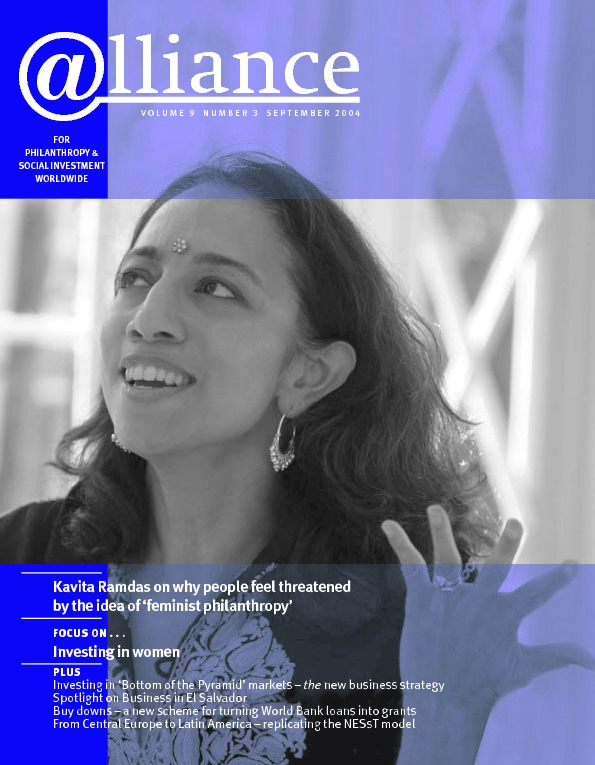Brazil may not yet offer its companies the glitzy, Oscar-style recognition for their CSR activities that Carla describes, but some of these activities are none the less extremely ambitious. Unlike Carla, I’m not an expert on CSR in my own country, so cannot compare CSR practice in the UK and Brazil, but on a recent visit to Brazil I was very struck with the fact that some companies are actually aiming to change the human development indicators in the areas where they work.
In Brazil, I was told, widespread poverty means that there is no critical mass of people who have enough wealth to give away substantial amounts. The government is widely perceived as inefficient and unable to deliver services. Increasingly, therefore, companies are accepting that they must step into the breach.
In Guarulhos, a municipality of São Paulo with a population of 1.2 million, of whom 300,000 live in slums, 38 people from businesses and business associations based in the area have formed a non-profit called Viva Guarulhos with the aim of bringing together all three sectors to improve the quality of life in Guarulhos. All municipalities in Brazil have their own set of human development indicators. Guarulhos is now 183rd out of around 500, but these businesspeople want it to be tenth. Working with IDIS[1] to develop the programme, they’ve decided to focus on three main areas – housing, work and income, and health. They also want to encourage social investment in the area. They’re not working on education because the indicator for education is already close to the acceptable rate for the UN. And they’re hoping to achieve all this in just six years.
In Pernambuco State, 50 companies have taken on the task of improving the quality of basic education and so raising literacy levels. Their starting point: Brazil is the 12th largest economy in the world but only 72nd in terms of human development. ‘How can we close the gap?’ Once they can demonstrate success in Pernambuco, they hope to mobilize a government programme at national level.
Avon is another company with big plans. The main focus of the Avon Institute, formed in March 2003, is breast cancer. In Brazil, almost 70 per cent of cancers are detected late. According to CEO Lirio Cipriani, ‘We want to be one of the companies responsible for lowering deaths.’ Avon’s 900,000 reps in Brazil can bring information to millions of Brazilian women, as well as raising money by selling products that support the cause.[2]
Many organizations are working with Brazilian companies to encourage CSR activity. The most prominent of these, mentioned by Carla, is the Ethos Institute. IDIS works with individual companies to help them develop their social investment programmes.
In the US, and even more in Europe, there is much talk of the ‘business case’ for CSR. In Brazil, this is less apparent. According to IDIS president Marcos Kisil, ‘We aim to help people make better use of resources. Then people will put in more money.’ In other words, people want to see social impact. This view is echoed by Antonio Ermirio de Moraes Filho, Vice President of the Votorantim Institute, one of IDIS’s former clients. Asked what it would take to get other companies involved, his answer consists of one word: ‘Results.’ ‘Previously, we were investing a lot but not having much impact,’ he says.
Given the considerable resources going into promoting social responsibility and social investment among Brazilian companies, one has to ask the question: could all this be achieving more? There are some who think so. Cindy Lessa of the Synergos Institute is one. ‘There is need for more collaboration between investors as well as a common agenda and clear intention for change,’ she says. ‘Investments made by private companies in their individual programmes cannot promote the kind of impact that is needed for change, no matter how well planned or intentioned. Private investors must also work more closely with social change organizations.’
One interesting recent development is the formation last year of the Redpuentes network, through which NGOs and unions in Brazil, Chile, Mexico, Argentina and the Netherlands will aim to give voice to civil society’s opinion as to what CSR should be doing.[3]
1 Institute for the Development of Social Investment.
2 There were 41,000 new cases in 2003, of whom 10,000 were dead within five years. Each brochure delivered by an Avon rep contains at least one product that supports the cause; 7 per cent of customer price goes to the Avon Institute and 100 per cent of this goes to projects.
3 See http://www.redpuentes.org



Comments (0)